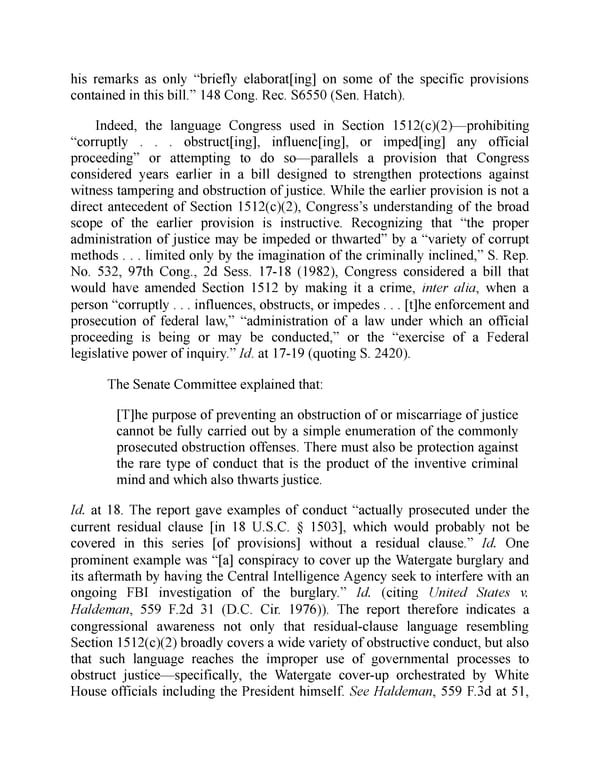his remarks as only “briefly elaborat[ing] on some of the specific provisions contained in this bill.” 148 Cong. Rec. S6550 (Sen. Hatch). Indeed, the language Congress used in Section 1512(c)(2)—prohibiting “corruptly . . . obstruct[ing], influenc[ing], or imped[ing] any official proceeding” or attempting to do so—parallels a provision that Congress considered years earlier in a bill designed to strengthen protections against witness tampering and obstruction of justice. While the earlier provision is not a direct antecedent of Section 1512(c)(2), Congress’s understanding of the broad scope of the earlier provision is instructive. Recognizing that “the proper administration of justice may be impeded or thwarted” by a “variety of corrupt methods . . . limited only by the imagination of the criminally inclined,” S. Rep. No. 532, 97th Cong., 2d Sess. 17-18 (1982), Congress considered a bill that would have amended Section 1512 by making it a crime, inter alia, when a person “corruptly . . . influences, obstructs, or impedes . . . [t]he enforcement and prosecution of federal law,” “administration of a law under which an official proceeding is being or may be conducted,” or the “exercise of a Federal legislative power of inquiry.” Id. at 17-19 (quoting S. 2420). The Senate Committee explained that: [T]he purpose of preventing an obstruction of or miscarriage of justice cannot be fully carried out by a simple enumeration of the commonly prosecuted obstruction offenses. There must also be protection against the rare type of conduct that is the product of the inventive criminal mind and which also thwarts justice. Id. at 18. The report gave examples of conduct “actually prosecuted under the current residual clause [in 18 U.S.C. § 1503], which would probably not be covered in this series [of provisions] without a residual clause.” Id. One prominent example was “[a] conspiracy to cover up the Watergate burglary and its aftermath by having the Central Intelligence Agency seek to interfere with an ongoing FBI investigation of the burglary.” Id. (citing United States v. Haldeman, 559 F.2d 31 (D.C. Cir. 1976)). The report therefore indicates a congressional awareness not only that residual-clause language resembling Section 1512(c)(2) broadly covers a wide variety of obstructive conduct, but also that such language reaches the improper use of governmental processes to obstruct justice—specifically, the Watergate cover-up orchestrated by White House officials including the President himself. See Haldeman, 559 F.3d at 51,
 Mueller Report PDF Page 493 Page 495
Mueller Report PDF Page 493 Page 495